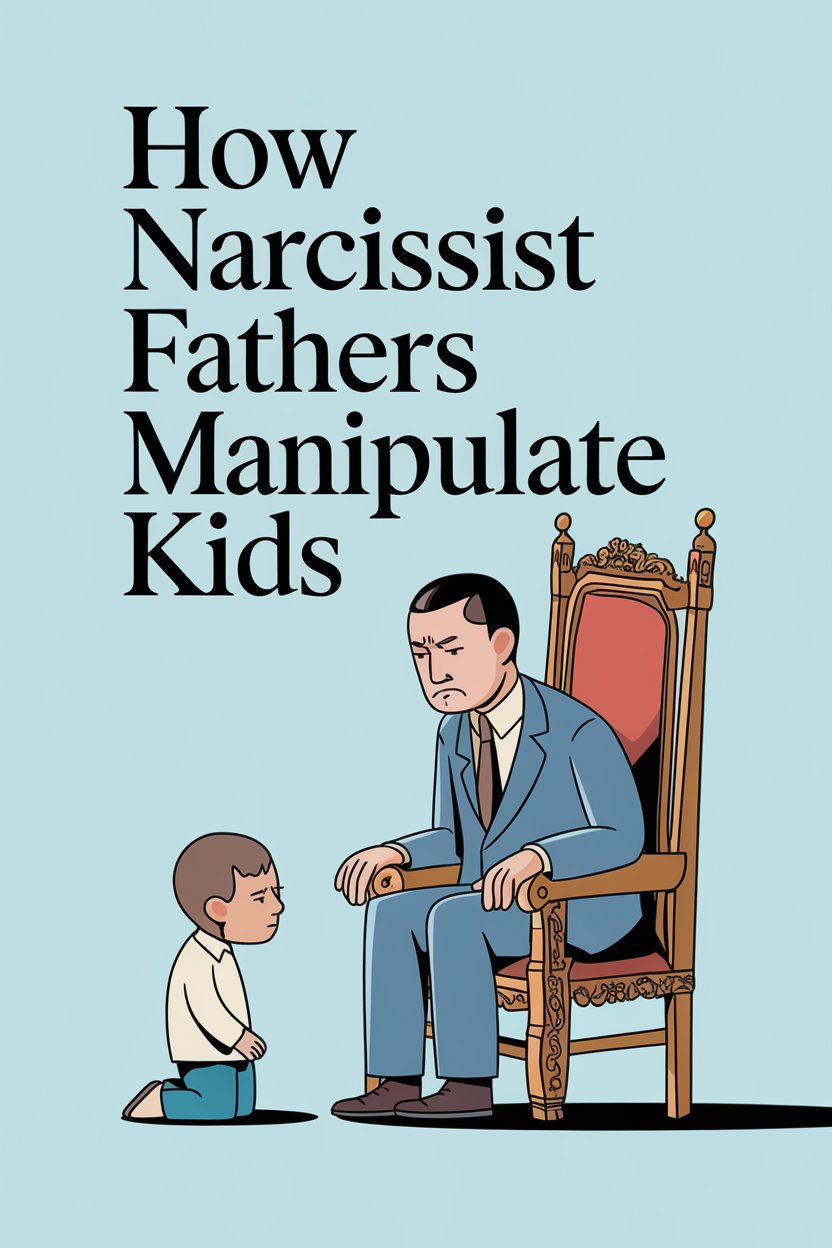If you thought sibling rivalry was complicated, try growing up with a narcissistic father.
Suddenly, your childhood feels more like a chess match, except only one player knows the rules—and surprise, it’s not the kid.
The Narcissist’s Tool Kit
Narcissistic fathers have a signature set of “parenting” moves. We’re not just talking about forgetting birthdays or being lousy at the three-legged race.
This is about emotional sleight-of-hand: a blend of guilt-trips, reality-bending, and a near-magical ability to turn the family home into a stage where dad is always the star.
The goal? To keep everyone orbiting his ego like moths around a flickering porch light.
Gaslighting With a Parental Twist
Memory is a slippery thing when dad’s got a narcissistic streak. Did he really promise to come to your school play? Was he “just joking” when he insulted your new haircut?
Apparently, your faulty recall is the issue, not his behavior.
Kids end up doubting their own perceptions and feelings. Over time, they start second-guessing themselves about just about everything—from whether dad really yelled at them to whether they even deserved it.
The result is the ultimate magic trick: making a child question their own reality.
Conditional Love on a Loop
Every child craves approval from their parents. A narcissistic father knows this and uses it like a remote control, conditional on everything from good grades to perfect manners to echoing his opinions at the dinner table.
Mess up, or worse, outshine him? Suddenly that affection disappears, and the cold shoulder moves in for a long stay. Kids learn fast: love isn’t a birthright, it’s a prize for being exactly who dad wants you to be.
Spoiler alert: Even then, it’s never quite enough.
Triangulation: The Family Drama Classic
Why settle for one-on-one manipulation when you can pit your own children against each other, or better yet, against their other parent? Narcissistic fathers stir the pot by playing favorites, spreading rumors, or inventing rivalries.
Suddenly, siblings are eyeing each other across the dinner table like it’s a spaghetti western, all while dad sits back, pleased with the chaos.
Any time the kids unite, he’ll find a way to split them up again. Heaven forbid anyone figures out what he’s up to.
The Endless Quest for Validation
Narcissists feed on admiration like it’s oxygen. Expect lots of “Look at me!” moments, from humble-bragging about their high school football glory days to hijacking every family event.
Children learn that validating dad’s ego is just another household chore—right up there with taking out the trash. And if they ever forget?
Prepare for sulking, angry outbursts, or those classic guilt-inducing speeches about “all the things I do for this family.”
Emotional Withholding: The Silent Treatment Pro
If you ever wondered where kids learn the fine art of silent sulking, look no further. A narcissistic father can turn emotional coldness into an Olympic sport.
When a child disappoints him (which, let’s be honest, is as easy as breathing), dad withdraws love, attention, and sometimes even basic communication.
The silent treatment isn’t just a timeout; it’s a message: “You don’t exist until you learn to please me.”
Projecting His Flaws Onto Kids
Nothing says self-awareness like blaming your own issues on your child.
Did dad lose his temper? Must be your fault for being “so difficult.” Insecure about his job? Suddenly he’s harping on your “laziness” or “lack of ambition.”
Kids are cast as the villains in dad’s personal soap opera. Before long, they internalize this blame, convinced there’s something fundamentally wrong with them—never suspecting dad’s just offloading his baggage.
Playing the Victim When It Suits
Narcissistic fathers are quick to claim the moral high ground—especially when anyone calls them out. If a child pushes back, dad suddenly morphs from tyrant to misunderstood hero.
He’ll sigh about how “ungrateful” everyone is or spin tales of his own tragic childhood. The goal? To turn critique into pity, and to guilt-trip kids into silence. It’s emotional jujitsu, and dad has a black belt.
Sabotaging Independence
The last thing a narcissistic father wants is a kid who can think or act for themselves. Every step toward autonomy—making friends, developing new interests, even choosing a college—gets met with sabotage or ridicule.
He’ll belittle dreams, mock choices, or insist on “knowing what’s best.” If all else fails, there’s always guilt: “You’ll regret leaving me,” or “After all I’ve done for you.”
Freedom starts to look less like a milestone and more like a betrayal.
Love Bombing and Withdrawing
“Love bombing” isn’t just for cult leaders and bad Tinder dates. Narcissistic fathers alternate between smothering affection and sudden coldness, keeping kids on an emotional seesaw.
One day, he’s your best friend—buying gifts, doling out praise, promising the world. The next, he’s withdrawn and distant.
The unpredictability is addictive and exhausting, leaving children desperate to get back in dad’s good graces.
Turning Apologies Into Power Plays
If you’re waiting for a narcissistic father to say, “I’m sorry,” pack a lunch—it’s going to be a while. On the rare occasion he does apologize, it’s less about remorse and more about regaining control.
Expect non-apologies like, “I’m sorry you feel that way,” or the classic, “I’m sorry if you misunderstood me.” The aim is to put the blame back on the child and maintain the upper hand.
Manipulating Through Money
Financial strings become emotional shackles. Narcissistic fathers use money as both carrot and stick: gifts, allowances, or paying for college are all transactional, with plenty of strings attached.
Any attempt at independence risks financial retaliation—cutting off support, holding debts over your head, or simply reminding you who holds the purse strings.
The message is clear: gratitude is expected, and dissent is expensive.
Playing Favorites to Divide and Conquer
Narcissistic fathers excel at favoritism. Some kids win the “golden child” lottery, while others get cast as scapegoats.
The chosen one is showered with praise (and pressure), while the rest are left feeling invisible or perpetually wrong.
This isn’t accidental—it’s a strategy to keep siblings competing for dad’s affection, distracting everyone from what’s really going on.
Ruining Big Moments
Weddings, graduations, birthdays—prime opportunities for a narcissistic father to make everything about himself. Expect drama, last-minute demands, or emotional meltdowns expertly timed to steal the spotlight.
Kids learn to dread special occasions, knowing that any joy or recognition is fair game for sabotage.
The Legacy of Manipulation
Growing up under the thumb of a narcissistic father leaves marks that last well into adulthood. Trust issues, anxiety, low self-esteem, and trouble forming healthy relationships—it’s a party favor nobody asked for.
But here’s the twist: awareness is the first step toward breaking the cycle. Spotting the patterns means you’re half-way to dodging them. Healing is messy, but possible.
Escaping the Gravitational Pull
Dealing with a narcissistic father isn’t about finally earning his approval (spoiler: you won’t), or being the perfect child.
It’s about recognizing manipulation, setting boundaries that protect your sanity, and finding support outside the family—think therapy, supportive friends, maybe the occasional stress ball.
Kids, teens, and even adults can reclaim their sense of self. Choose your own values. Find mentors and relationships that don’t come with a side of strings attached.
And when in doubt, remember: you’re not the broken one here.
Better Than Surviving
Growing up with a narcissistic father is like learning to dance with a partner who keeps changing the song. But that doesn’t mean you’re stuck with two left feet for life.
Healing means finding your own rhythm, tuning out the noise, and—eventually—building a life that feels like yours. Drama-free family gatherings not included.
But self-respect, confidence, and a well-earned sense of humor? Absolutely on the menu.


